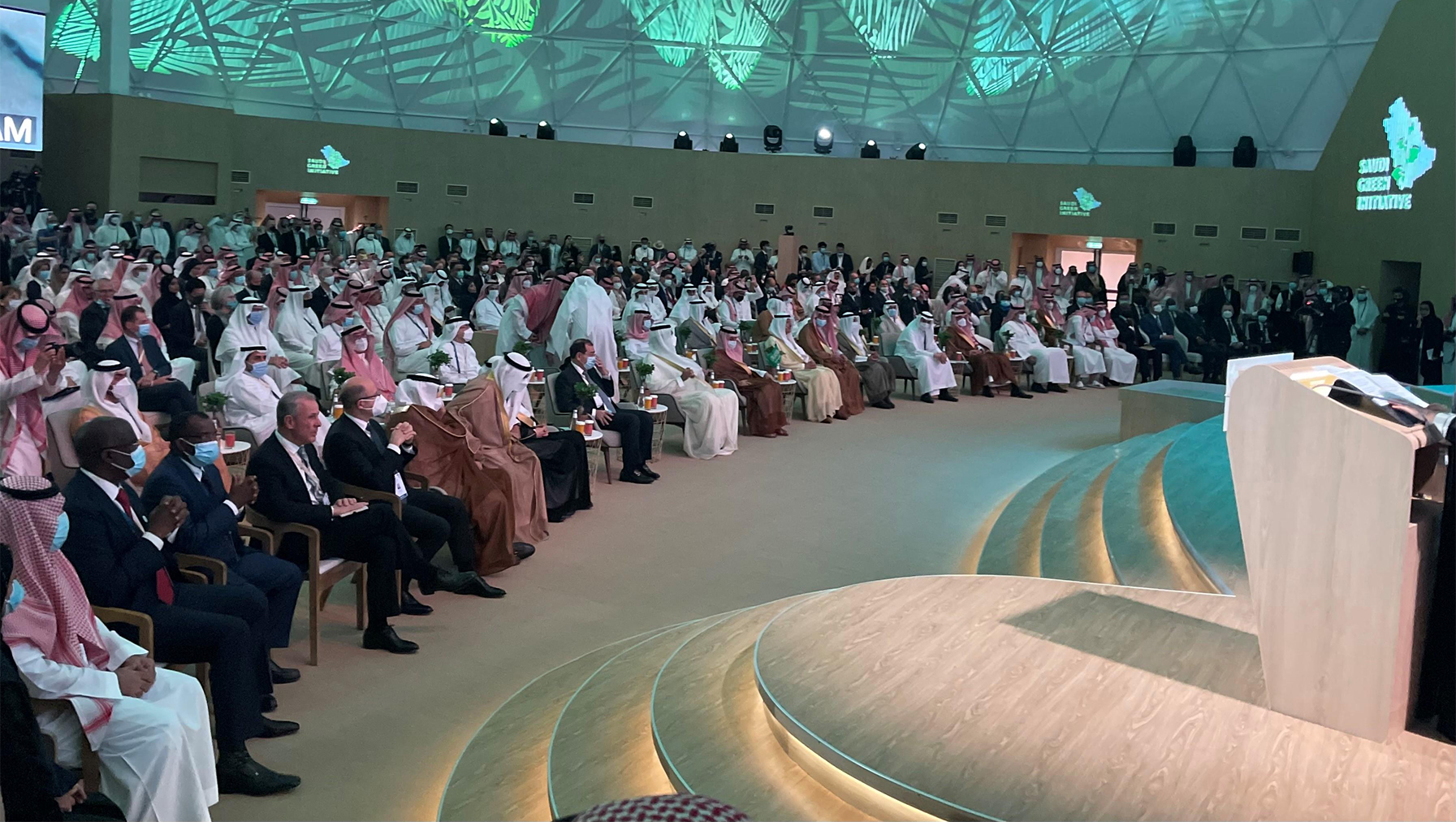There has been a steady stream of forums during 2021 in the Arab World, which have dealt with a wide scope of issues. However, issues related to the environment, economic and sustainable development have been given special attention. There were several important forums that dealt with these issues, including the first edition of the annual “Green Saudi Arabia” forum in Riyadh, the International Water Forum on northern and eastern Syria held in Al-Hasaka, the Arab Water Forum hosted in Dubai and the Morocco-UAE Economic Forum. Security is also of paramount importance to Arab countries, which was reflected in the topics discussed in the Assilah Forum, dealing with cooperation between Arab countries and the African countries of the Sahel region. The topics of these forums reflect the objectives that Arab countries are currently giving priority.
A “Green” Era
Crown Prince Mohammed bin Salman launched the first iteration of the annual Green Saudi Arabia forum in Riyadh on October 23rd, in the context of developing a roadmap to protect the environment and confront the challenges of climate change. The road map aims to contribute to reducing carbon emissions, adopting an afforestation policy by planting more than 450 million trees, rehabilitating 8 million hectares of degraded lands, and designating new areas as protected lands, bringing protected lands in the Kingdom to more than 20% of its total area. The aim is to transform Riyadh into one of the most sustainable cities in the world.
According to Prince Mohammed bin Salman’s media statements, he aims for Saudi Arabia to reach carbon neutrality in 2060, through the circular carbon economy approach, in line with the Kingdom’s development plans, enabling its economic diversification and preserving the Kingdom’s leading role in enhancing the security and stability of energy markets. He added, “This first package of initiatives represents investments worth more than SAR 700 billion, which contributes to the development of the green economy, creating quality job opportunities, and providing huge investment opportunities for the private sector, in accordance with the Kingdom’s Vision 2030.”
This was also reflected in Saudi Arabia hosting the first “Fourth Industrial Revolution Forum”, organized by the King Abdul Aziz City for Science and Technology on July 28, in cooperation with the World Economic Forum. Forum participants discussed the impact of emerging technologies on the future of transportation, building resilient healthcare systems, clean energy transitions, building future smart cities, ecosystem restoration, and the future of finance. The forum represents the achievement of one of the objectives of the Kingdom’s Vision 2030 to transform towards an innovation-based economy.
Security and the region’s neighborhood
The Assilah Forum was held in Morocco on October 29th, chaired by former Foreign Minister Mohamed Benaissa, under the title: “The Maghreb and the Sahel: An Inevitable Partnership”. With the participation of a selection of ministers, current and former ambassadors, experts, and academics, the event reflected Morocco’s growing interest in the Sahel region, politically and economically, as well as its recognition of the current security challenges in the joint border areas.
The forum focused on the foundations and motivations of integration between the Maghreb and the Sahel, security policies and approaches to confronting extremism and terrorism as applying by the two regions. Security issues are particularly challenging in view of the rise of militant radical groups, whose activities extend from the Niger River to Chad, as well as the complexities of the Libyan crisis. These issues impact the security of Maghreb and regional countries, forming the context of the Maghreb’s relations with the Sahel during a period in which Africa has become the focus of competition between traditional and emerging international powers.
Threats to water resources
On September 28th, the Environment Authority of the Autonomous Administration in the Syrian city of Al Hasakah held the International Water Forum in northeastern Syria under the slogan “Sustainable Water, Sustainable Life”. Water experts and civil society organizations from within the region and abroad participated in the forum, with the aim of finding solutions to the water problems facing Syria and Iraq. These problems relate to Turkey’s control over the Tigris and Euphrates rivers and the Allouk station and take the form of a reduction in the supply of drinking water and limiting the resources available to irrigate agricultural lands, especially with scarce rain.
The forum sought to separate these water issues from political differences with Turkey, especially in view of Turkish presence in northeast Syria since October 2019. The choice to hold the forum in the city of the Al Hasakah was particularly symbolic, since it is a city threatened with extreme water scarcity. Participants in the forum called on the international community to pressure Turkey to stop reducing water flows into Syria and Iraq, highlighting the destructive impact of these reduced flows on the region’s communities and refugee camps. They also called on the Autonomous Administration to establish programs to ration the usage of water, as well as preventing the pollution of running and groundwater.
Sustainable development
The Arab Water Forum was held in Dubai on September 21st under the auspices of the UAE Ministry of Energy and Infrastructure, with the support of the Arab League and the Egyptian Ministry of Water Resources and Irrigation, and in cooperation with national, regional and international partners. Participants focused on the need to achieve Arab water security in order to maintain peace and achieve sustainable development. There is growing water scarcity in the Arab region with the depletion of water resources, and it is exacerbated by unrest, armed conflicts, and the waves of asylum and displacement that plague the countries of the region, which are related to the growing demand for natural resources. Water scarcity is therefore a major challenge to sustainable development in the Arab world, undermining food security, economic development, livelihoods, and human health.
Loic Fauchon, President of the World Water Council, summarized the situation by declaring that “from the Strait of Gibraltar to the Sultanate of Oman, from Jordan to Sudan, from west to east, and from north to south, Arab countries face water shortages and depletion of resources that slow their development and create unbearable tensions. The Forum is being held at a time when the region is struggling with water scarcity of a critical level, with increased demand for clean water due to the growing population; the MENA region is home to 6% of the world’s population and less than 2% of the world’s renewable water supplies, according to the World Bank.”
The need to provide all the necessary foundations of sustainable development, including necessary financial backing, was reflected in the launching by Egypt’s Ministry of International Cooperation of the first session of the “Egypt Forum for International Cooperation and Development Financing” on September 8th and 9th. Major economic and social developmental organizations participated in this forum, including the United Nations, World Bank Group, European Bank for Reconstruction and Development, African Development Bank Group, and Arab Fund for Economic and Social Development. The forum was also attended by several ministers and policy makers from Africa, Asia, and Latin America, in addition to heads of international financial institutions, representatives of bilateral and multilateral development partners, representatives of the business community and the private sector, and international and regional research centers. The organization of this forum reflected Egypt’s belief in the importance of unifying efforts and directing international cooperation and development financing to achieve comprehensive and sustainable development for all peoples, especially in emerging and developing economies, with a focus on Africa.
Regional economic integration
The Morocco-UAE Economic Forum, held in southern Morocco’s Laayoune on July 12th and 13th, under the slogan New Horizon and New Partnerships, represents an institutionalized mechanism to enhance public and private sector cooperation between the two countries, especially in the fields of agriculture, fishing, minerals, telecommunications, renewable energy, tourism and services. This was confirmed by UAE Consul General in Laayoune Issa Ali Al Balushi during the forum, which enhances economic relations between the two countries, bearing in mind that the UAE is the largest Arab investor in Morocco. The UAE also opened a consulate in the city of Laayoune in November 2020, as the first diplomatic representation of an Arab country in the southern provinces of the Kingdom, which is a fertile ground for investment.
The same applies to the Libyan-Algerian Economic Forum, which was held on May 31st. The forum was attended by Algerian President Abdelmadjid Tebboune and the head of the Libyan National Unity Government Abdelhamid Dabaiba, as well as 400 investors and businessmen. It coincided with Algeria’s announcement of its readiness to open a land border crossing with Libya, in addition to talks to launch a sea line with Tripoli. The forum focused on cooperation in the fields of electricity and health, and the resumption of Algerian company Sonatrach’s work in the Libyan oilfield. There were also discussions of opening airspace and land ports and facilitating the transportation of goods and travelers. This, perhaps, reflects the Libyan government’s endeavor to communicate to Arab governments and companies in countries such as Egypt, the UAE, Tunisia, and Morocco, its wish for them to resume previous projects in the country.
Numerous Characteristics
Regional and international forums are likely to remain a constant feature in the Arab World in the near future, as Arab countries continue to face multiple challenges that can only be confronted through multilateral cooperation. These wide ranging challenges include dealing with environmental pollution, reducing carbon emissions, keeping pace with the Fourth Industrial Revolution technologies, transitioning to clean energy, transboundary water management, strengthening development finance for emerging economies, and addressing the risks of terrorism.


